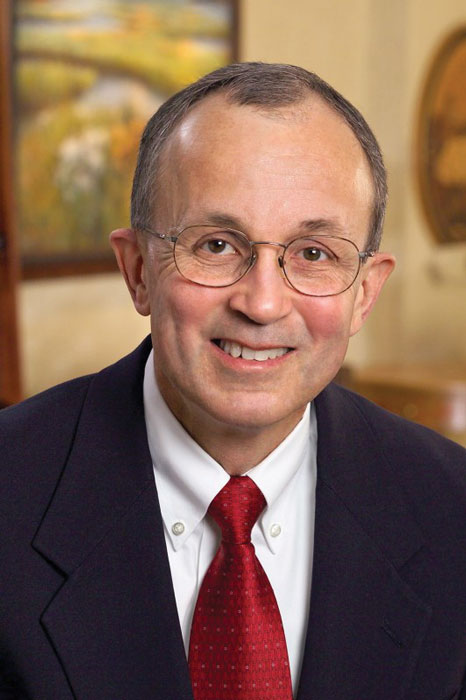 Former anesthesiology chair David Chestnut is honoring his parents, Fred and Bessie Mae Chestnut (pictured), by establishing a medical student scholarship in their names.The story of Fred and Bessie Mae Chestnut is a classic tale of America’s Greatest Generation. Born in 1918 in Orrville, Alabama, as the son of a sawmill worker, Fred Chestnut grew up wherever the work took his father during the Great Depression. After graduating from high school in 1938, he began building public projects around Alabama with the Civilian Conservation Corps, a New Deal program for unemployed, unmarried men.
Former anesthesiology chair David Chestnut is honoring his parents, Fred and Bessie Mae Chestnut (pictured), by establishing a medical student scholarship in their names.The story of Fred and Bessie Mae Chestnut is a classic tale of America’s Greatest Generation. Born in 1918 in Orrville, Alabama, as the son of a sawmill worker, Fred Chestnut grew up wherever the work took his father during the Great Depression. After graduating from high school in 1938, he began building public projects around Alabama with the Civilian Conservation Corps, a New Deal program for unemployed, unmarried men.
When World War II broke out, he enlisted in the Army Air Corps, serving as a wireless radio operator in India and China for three years. When he returned home, he attended Howard College (now Samford University) on the GI Bill.
At Howard, Fred met Bessie Mae McElroy of Cuba, Alabama, who shared his love of learning and deep faith. She completed a year at Southwestern Baptist Theological Seminary in Fort Worth. The couple married in 1951 after Fred completed training at New Orleans Baptist Theological Seminary with the goal of returning to China as a missionary.
By then, China had closed its border to foreign missionaries, so instead the Chestnuts served rural churches until 1957, when Fred accepted an appointment to teach Biblical studies to seminary students at Selma University, a historically black Baptist college.
For the next 33 years, the Chestnuts made Selma their home. They raised two children—David, a highly regarded obstetric anesthesiologist, and Martha, now retired from global professional service company Accenture—who would give them six grandchildren.
David Chestnut, M.D., is honoring his parents’ legacy—one of sharing their faith and helping the African-American community in Alabama—by creating an endowed scholarship at the UAB School of Medicine that gives preference to African-American medical students.
 David Chestnut is a 1978 School of Medicine alumnus, former chair of the UAB Department of Anesthesiology, and now on the faculty of Vanderbilt University.“I wanted to honor their example,” says Chestnut, a 1978 School of Medicine alumnus, former chair of the UAB Department of Anesthesiology, and now on the faculty of Vanderbilt University. “They were part of the Greatest Generation—humble backgrounds, a lot of hardship, and called to their work.”
David Chestnut is a 1978 School of Medicine alumnus, former chair of the UAB Department of Anesthesiology, and now on the faculty of Vanderbilt University.“I wanted to honor their example,” says Chestnut, a 1978 School of Medicine alumnus, former chair of the UAB Department of Anesthesiology, and now on the faculty of Vanderbilt University. “They were part of the Greatest Generation—humble backgrounds, a lot of hardship, and called to their work.”
When her children were in junior high school, Bessie Mae taught homebound students in Selma. She later drove 100 miles per day to the University of Montevallo to earn her teaching certificate, which she used for 17 years teaching in the Selma public schools until retiring in 1988.
Two years later, Fred Chestnut was diagnosed with a terminal illness. “I was on the faculty at the University of Iowa, and I came home to see him as often as possible,” Dr. Chestnut says. To pass the time, Dr. Chestnut read aloud passages from Auburn University historian Wayne Flynt’s Poor But Proud: Alabama’s Poor Whites.
“My father and I both knew Wayne Flynt, another Samford graduate. His book and the time we spent together brought out stories that I had not heard before,” Dr. Chestnut recalls. “I knew he’d had to repeat the fourth grade, and I assumed he had failed, though that had never made sense to me because he was a college graduate.
“I learned that back in those days, public schools could charge tuition. My father owed $4 for that year’s tuition, and he had to repeat the year because the family could not afford to pay it.”
Fred Chestnut passed away in 1990, and Bessie Mae Chestnut died in 2012. In 2007, Dr. Chestnut and his wife, Janet, established the Fred and Bessie Mae Chestnut Endowed Medical Scholarship. They have made additional gifts to the fund through The Campaign for UAB and have also included it in their estate plan.
“My parents taught me to give back, starting with the first 10 percent to the church,” he says. “We feel strongly about that and have passed it on to our five children.
“My parents taught us to have servant hearts, and they lived that every day.”
To support scholarships in the School of Medicine, contact Jessica Brooks Lane at (205) 975-4452.
By Virginia Gilbert-Loftin